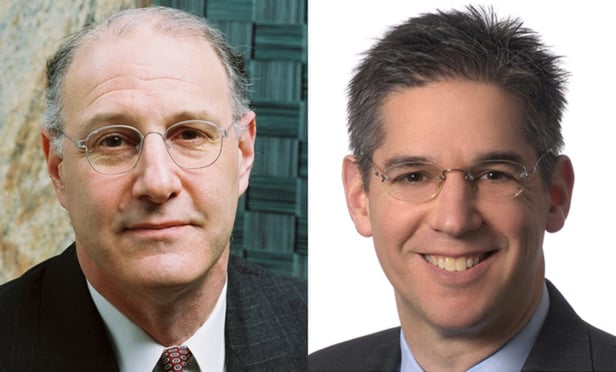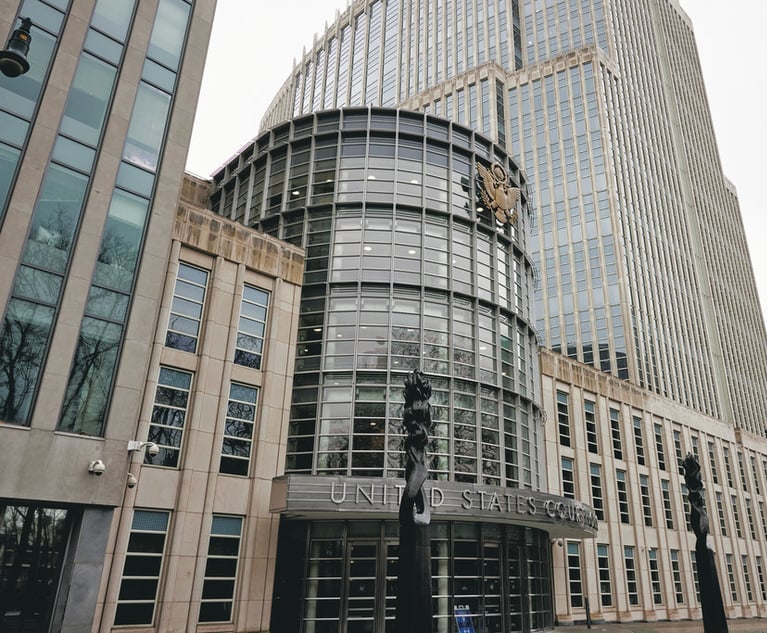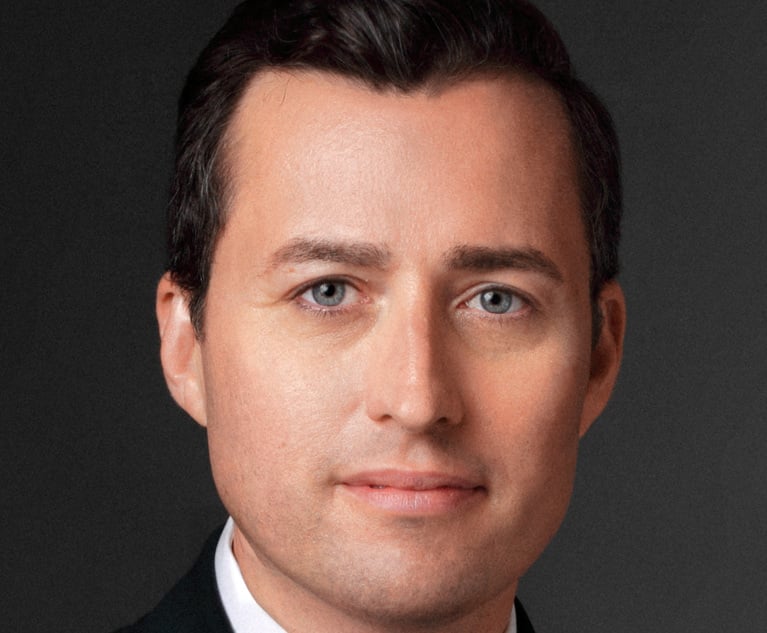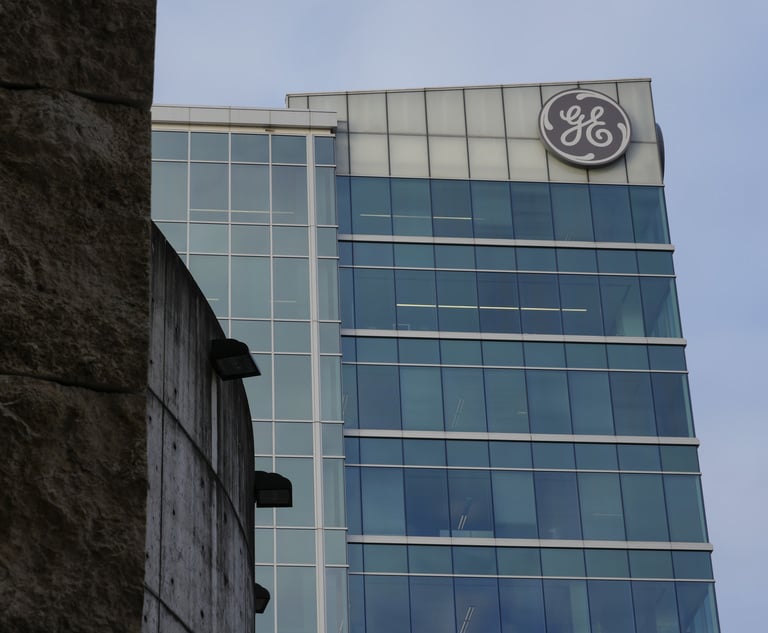Climate Change-Related Losses and Other Event-Driven Litigation Risks
In their Corporate Insurance Law column, Howard B. Epstein and Theodore A. Keyes discuss how climate change-related events such as hurricanes, earthquakes and wildfires can lead to related securities litigation, creating additional risk for corporations, directors and officers and their D&O insurers.
January 28, 2019 at 02:45 PM
6 minute read
 Howard B. Epstein and Theodore A. Keyes
Howard B. Epstein and Theodore A. Keyes
Hurricanes Harvey, Maria and Irma, the earthquakes in Mexico, the typhoon in Bangladesh and massive flooding in India kept natural disasters in the news throughout 2017 and caused damages, deaths and record losses to the insurance industry. While 2018 started off more quietly, hurricanes and wildfires in the second half of the year caused devastating damage.
In the wake of news about PG&E's impending bankruptcy filing, wildfires continue to be the subject of much discussion. Primarily due to the California wildfires, as well as tropical storms, global losses from natural disasters in 2018, while not as devastating as in 2017, continued to be well above the 30-year average according to a report recently published by Munich RE. Petra Löw, The natural disasters of 2018 in figures, Munich RE (Jan. 8, 2019).
In fact, the Camp Fire in Northern California is reported to have been the most destructive wildfire in decades and the costliest natural disaster of 2018 for insureds and for the insurance industry. According to the Munich Re report, losses attributable to the Camp Fire reached $16.5 billion of which $12.5 billion was insured loss. Overall, Munich Re reported that the California wildfires were responsible for $24 billion in losses in 2018, of which $18 billion was insured.
Globally, in 2018, annual losses due to natural disasters totaled approximately $160 billion. According to the Munich Re report, 2018 ranks tenth worst in terms of overall disaster loss and fourth worst since 1980 in terms of insured losses from natural disasters. In addition to the $24 billion in loss from wildfires, tropical storms including Hurricanes Michael and Florence and a trio of typhoons in Asia, including Typhoon Jebi, caused approximately $57 billion in loss globally. By way of comparison, Hurricane Michael was responsible for $16 billion in loss, of which $10 billion was insured, and Hurricane Florence was responsible for $14 billion in loss, of which only $5 billion was insured loss.
Overall, about half of the $160 billion in global loss from natural disasters in 2018 were insured. The insured losses were heavily concentrated in North America, where approximately 68 percent of loss was insured, while about 23 percent of loss in Asia was insured and less than ten percent of losses in Europe and the rest of the world were insured.
Climate Change-Related Risks
Natural disasters obviously pose risks to insurers and insureds' property and persons whether or not the catastrophes can be linked to climate change. However, climate change-related events pose additional risks for which insureds and insurers need to develop strategies. These risks may extend beyond exposure to potential first-party property damage losses.
For example, in California, a series of lawsuits have been filed by municipalities against oil and gas producing companies seeking to hold the companies responsible for damages arising from climate change-related events. The municipalities claim that the defendant companies' greenhouse gas-related operations have caused damages and seek to recover based on several common law tort causes of action. See, e.g., The County of Santa Cruz v. Chevron, Case No. 17CV03242 (Superior Court of State of California, County of Santa Cruz); The County of San Mateo v, Chevron, Case No. 17CIV03222 (Superior Court of State of California, County of San Mateo).
Whether or not these cases can proceed in state court and whether the claims are preempted by prior federal case law rulings is currently the subject of extensive motion practice and related appeals. However, it is notable that the municipalities contend that a wide range of dire climate change-related effects are occurring or will occur with more frequency, including rising ocean temperatures, sea level rise, drought, heat waves, extreme precipitation, flooding and wildfires. The increased frequency of such events raises the prospect of increasing potential loss due to first-party property damage arising from these events as well as potential exposure to additional claims seeking to hold companies responsible for that loss.
Event-Driven Litigation
These climate change-related events may also, in some circumstances, spawn related securities litigation, creating additional risk for corporations, directors and officers and their D&O insurers. With increasing frequency, plaintiff shareholders have seized on negative events as a basis to file suits alleging claims of mismanagement and/or misrepresentation against directors and officers. Climate change-related catastrophes are just one type of negative event that can and has been used by shareholders for that purpose.
For example, in 2018, shareholders filed suits against two California utilities alleging such claims of mismanagement. In November, PG&E was sued in a shareholder derivative suit that alleged the utility had made misrepresentations about PGE's fire safety management and readiness. This followed an earlier securities class action lawsuit against PG&E which concerned wildfires occurring in 2017. In addition, also in 2018, a shareholder filed suit against Edison International alleging that the utility misled shareholders regarding wildfire issues including safety management. Kevin LaCroix, The Top Ten D&O Stories of 2018, The D&O Diary (Jan. 7, 2019).
While these lawsuits specifically concerned alleged mismanagement and disclosures related to wildfires, with plaintiff shareholders in search of negative events to justify a lawsuit, there is no reason to think that other climate-related events would not serve a similar purpose as the centerpiece of a shareholder's complaint. Droughts, flood and excessive heat waves, for example, might all yield significant damages and might also serve as the basis for claims regarding mismanagement or failure to properly disclose risks related to climate change.
Consequently, while commercial real estate investors should not be surprised if climate change-related events impact their business, these natural disasters have the potential to impact broader segments of the business community and their insurers.
Looking Forward
Climate change related-events are not the only drivers of event-driven litigation—others include cyber security attacks, sexual harassment allegations, bribery or corruption and pharmaceutical or medical device failures. Shareholders appear willing to seize on any negative event that generates considerable publicity as support for a management liability claim. However, since natural disasters are almost certain to cause losses and be well covered by the news media, climate change-related events may be particularly well-suited for this purpose.
Of course, we all hope that 2019 will be a year free of significant loss from natural disasters. However, the reality is that insureds and insurers need to address and plan for the full scope of risk from climate change-related events.
Howard B. Epstein is a partner at Schulte Roth & Zabel. Theodore A. Keyes is special counsel at the firm.
This content has been archived. It is available through our partners, LexisNexis® and Bloomberg Law.
To view this content, please continue to their sites.
Not a Lexis Subscriber?
Subscribe Now
Not a Bloomberg Law Subscriber?
Subscribe Now
NOT FOR REPRINT
© 2025 ALM Global, LLC, All Rights Reserved. Request academic re-use from www.copyright.com. All other uses, submit a request to [email protected]. For more information visit Asset & Logo Licensing.
You Might Like
View All
Insurance Company Sues Over 180 Health Care Providers for Fraud Under RICO
3 minute read
New York Court of Appeals Tightens Pleading Standards Against Insurance Policyholder
7 minute read
Amid Growing Litigation Volume, Don't Expect UnitedHealthcare to Change Its Stripes After CEO's Killing
6 minute read
GE Agrees to $362.5M Deal to End Shareholder Claims Over Power, Insurance Risks
2 minute readTrending Stories
- 1Gunderson Dettmer Opens Atlanta Office With 3 Partners From Morris Manning
- 2Decision of the Day: Court Holds Accident with Post Driver Was 'Bizarre Occurrence,' Dismisses Action Brought Under Labor Law §240
- 3Judge Recommends Disbarment for Attorney Who Plotted to Hack Judge's Email, Phone
- 4Two Wilkinson Stekloff Associates Among Victims of DC Plane Crash
- 5Two More Victims Alleged in New Sean Combs Sex Trafficking Indictment
Who Got The Work
J. Brugh Lower of Gibbons has entered an appearance for industrial equipment supplier Devco Corporation in a pending trademark infringement lawsuit. The suit, accusing the defendant of selling knock-off Graco products, was filed Dec. 18 in New Jersey District Court by Rivkin Radler on behalf of Graco Inc. and Graco Minnesota. The case, assigned to U.S. District Judge Zahid N. Quraishi, is 3:24-cv-11294, Graco Inc. et al v. Devco Corporation.
Who Got The Work
Rebecca Maller-Stein and Kent A. Yalowitz of Arnold & Porter Kaye Scholer have entered their appearances for Hanaco Venture Capital and its executives, Lior Prosor and David Frankel, in a pending securities lawsuit. The action, filed on Dec. 24 in New York Southern District Court by Zell, Aron & Co. on behalf of Goldeneye Advisors, accuses the defendants of negligently and fraudulently managing the plaintiff's $1 million investment. The case, assigned to U.S. District Judge Vernon S. Broderick, is 1:24-cv-09918, Goldeneye Advisors, LLC v. Hanaco Venture Capital, Ltd. et al.
Who Got The Work
Attorneys from A&O Shearman has stepped in as defense counsel for Toronto-Dominion Bank and other defendants in a pending securities class action. The suit, filed Dec. 11 in New York Southern District Court by Bleichmar Fonti & Auld, accuses the defendants of concealing the bank's 'pervasive' deficiencies in regards to its compliance with the Bank Secrecy Act and the quality of its anti-money laundering controls. The case, assigned to U.S. District Judge Arun Subramanian, is 1:24-cv-09445, Gonzalez v. The Toronto-Dominion Bank et al.
Who Got The Work
Crown Castle International, a Pennsylvania company providing shared communications infrastructure, has turned to Luke D. Wolf of Gordon Rees Scully Mansukhani to fend off a pending breach-of-contract lawsuit. The court action, filed Nov. 25 in Michigan Eastern District Court by Hooper Hathaway PC on behalf of The Town Residences LLC, accuses Crown Castle of failing to transfer approximately $30,000 in utility payments from T-Mobile in breach of a roof-top lease and assignment agreement. The case, assigned to U.S. District Judge Susan K. Declercq, is 2:24-cv-13131, The Town Residences LLC v. T-Mobile US, Inc. et al.
Who Got The Work
Wilfred P. Coronato and Daniel M. Schwartz of McCarter & English have stepped in as defense counsel to Electrolux Home Products Inc. in a pending product liability lawsuit. The court action, filed Nov. 26 in New York Eastern District Court by Poulos Lopiccolo PC and Nagel Rice LLP on behalf of David Stern, alleges that the defendant's refrigerators’ drawers and shelving repeatedly break and fall apart within months after purchase. The case, assigned to U.S. District Judge Joan M. Azrack, is 2:24-cv-08204, Stern v. Electrolux Home Products, Inc.
Featured Firms
Law Offices of Gary Martin Hays & Associates, P.C.
(470) 294-1674
Law Offices of Mark E. Salomone
(857) 444-6468
Smith & Hassler
(713) 739-1250






